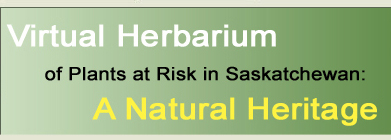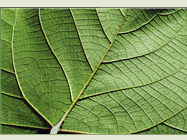|
| Besseya wyomingensis
(A. Nels.) Rydb. |
|
| |
| TAXONOMY |
| |
| Family: |
Scrophulariaceae |
| Genus: |
Besseya |
| |
| Species Synonyms: |
Besseya cinerea (Raf.) Pennell |
| Common Names: |
Wyoming kittentails
coral-drops |
| |
| DISTRIBUTION |
| |
| Canada: |
southern Alberta – southwestern Saskatchewan |
| Saskatchewan: |
southwestern Saskatchewan; Cypress Hills |
| Ecoregion: |
Cypress Upland |
| |
| HABITAT |
| |
| Saskatchewan: |
upland fescue grassland slopes |
| Associated Species: |
Packera cana |
| |
| RARITY STATUS |
| |
Provincial
Status According
to Harms (2003): |
Threatened |
| Nature Conservancy
Status: |
G5 S1 |
Saskatchewan
Species at
Risk Status: |
None |
| COSEWIC Status:
|
None |
| |
| Besseya wyomingensis
is threatened because it is rare and regionally restricted in Saskatchewan.
Possible threats have been identified for this species. |
| |
| SPECIES
DESCRIPTION |
| |
| Height: |
15 – 30 cm |
| Stems: |
erect, grey-puberulent to villous |
| Leaves: |
basal and cauline; basal leaves
long-petioled, 2 – 5 cm long, 1.5 – 4 cm wide, ovate to oblong,
base cuneate to subcordate, apex obtuse, often reddish-tinged, pinnately
veined, margin crenate to serrate; cauline leaves small, sessile, alternate,
lanceolate to ovate, margin toothed to entire |
| Inflorescence: |
spike dense, 2 – 5 cm
long (flower), 5 – 15 cm long (fruit), densely pubescent, usually
purplish-tinged; peduncle 5 – 25 cm |
| Flowers: |
perfect, zygomorphic; calyx
2-lobed; corolla absent; stamens 2, exserted, purplish; style filiform,
stigma capitate |
| Fruits: |
capsule many-seeded, about as
long as wide, villous, apex entire to scarcely notched; seeds flat, orbicular |
| |
| SCROPHULARIACEAE
KEY FOR GENERA FOUND IN SASKATCHEWAN |
| |
| 1 Stamens 2 |
2 |
| 1 Stamens 4 or 5 |
4 |
| |
|
| 2 Leaves alternate or all basal; corolla
absent |
Besseya |
| 2 Leaves opposite; corolla present |
3 |
| |
|
| 3 Calyx 4-lobed; stamens exserted |
Veronica |
| 3 Calyx 5-lobed; stamens inserted |
Gratiola |
| |
|
| 4 Leaves all basal |
5 |
| 4 At least some leaves cauline |
6 |
| |
|
| 5 Flowers solitary; corolla rotate
to campanulate; leaves usually entire or toothed |
Limosella |
| 5 Flowers in spicate racemes; corolla
bilabiate; leaves pinnately lobed or cleft |
Pedicularis |
| |
|
| 6 Corolla spurred |
7 |
| 6 Corolla not spurred |
9 |
| |
|
| 7 Corolla bluish-purple, 4.5 –
6 mm long, excluding spur; flowers solitary in leaf axils |
Chaenorrhinum |
| 7 Corolla yellow or blue, 10 –
13 mm long, excluding spur; flowers in terminal racemes |
8 |
| |
|
| 8 Slender annual, 10 – 40 cm
tall; corolla blue |
Nuttallanthus |
| 8 Stout perennial, 30 – 100
cm tall; corolla yellow and orange |
Linaria |
| |
|
| 9 Floral bracts coloured, concealing
flowers |
Castilleja |
| 9 Floral bracts green, flowers evident |
10 |
| |
|
| 10 Cauline leaves alternate |
11 |
| 10 Cauline leaves opposite |
13 |
| |
|
| 11 Stamens 5, filaments villous; corolla
actinomorphic, distinctly 5-lobed |
Verbascum |
| 11 Stamens 4, filaments glabrous;
corolla zygomorphic, indistinctly 5-lobed |
12 |
| |
|
| 12 Basal leaves absent; cauline leaves
usually entire, linear; flowers yellow |
Orthocarpus |
| 12 Basal leaves commonly present;
cauline leaves toothed or pinnately lobed; flowers yellow to
white or purple |
Pedicularis |
| |
|
| 13 Calyx 4-lobed |
14 |
| 13 Calyx 5-lobed |
17 |
| |
|
| 14 Corolla pink or purple |
Odontites |
| 14 Corolla white to yellow |
15 |
| |
|
| 15 Calyx about 1 cm long in flower,
enlarged, veiny, and membranous in fruit |
Rhinanthus |
| 15 Calyx less than 1 cm long in flower,
not enlarged in fruit |
16 |
| |
|
| 16 Leaves 2 – 10 mm long, lobed,
upper leaves sessile |
Euphrasia |
| 16 Leaves 10 – 40 mm long, more
or less entire, upper leaves petiolate |
Melampyrum |
| |
|
| 17 Staminode present, filamentous |
Penstemon |
| 17 Staminode absent or scale-like |
18 |
| |
|
| 18 Flowers blue; stamens enclosed
by lower lip; upper cauline leaves whorled |
Collinsia |
| 18 Flowers greenish to yellow or reddish;
stamens not enclosed by lower lip; cauline leaves all opposite |
19 |
| |
|
| 19 Corolla green with reddish or purple
tinge; flowers less conspicuous, less than 1 cm long; calyx
segments deeply parted |
Scrophularia |
| 19 Corolla yellow or pinkish red;
flowers large and showy, 1 – 4 cm long; calyx segments
united into tube |
Mimulus |
|






